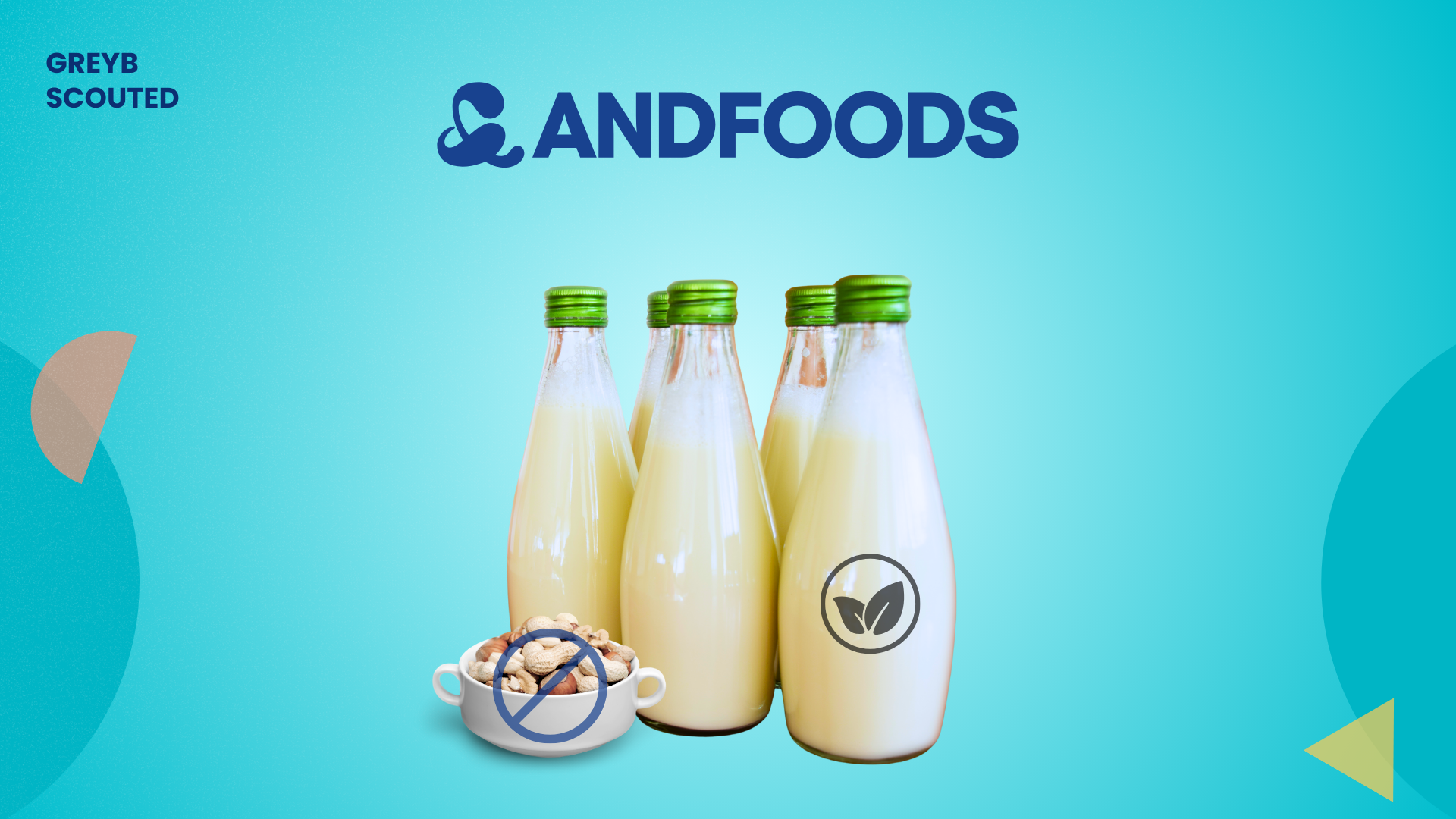Many plant-based dairy options, such as oat, almond, or rice milk, contain very little protein, some with less than 0.5%. They often rely on ingredients containing known allergens, such as soy and gluten. Because of that, these products still fail to fully match dairy in terms of function or flavor. What’s more, while fermentation is widely used in food innovation, few companies have successfully applied it to address taste and texture challenges in plant-based dairy.
AndFoods, a university spin-off, is addressing these issues by leveraging an underutilized, non-allergenic legume and transforming it into high-performance dairy alternatives through fermentation. Their flagship product, a whipped cream, achieves a 140% overrun and excellent foam stability, rivaling traditional dairy products. Importantly, their solution bypasses common allergens and enables B2B licensing across diverse applications—from ice creams to barista foams.
To better understand how their process works, we spoke to Arup Nag, the Co-founder and CTO at AndFoods. This article contains notable highlights from our entire conversation.
No posts found.This interview is part of our exclusive Scouted By GreyB series. Here, we speak with the founders of innovative startups to understand how their solutions address critical industry challenges and help ensure compliance with industry and government regulations. (Know more about startups scouted by GreyB!)
“We’re not just replacing dairy; we’re solving taste, nutrition, and allergen issues all at once using a legume no one else has touched.”
– Arup Nag

Arup Nag is the Co-founder and Chief Technology Officer (CTO) of AndFoods, a New Zealand-based startup pioneering plant-based dairy alternatives using legumes and pulse crops. Arup is recognized for combining scientific depth with practical engineering expertise, particularly in sustainable food production. At AndFoods, Arup helped develop a novel process to extract milk-like ingredients from one previously unexplored legume with a high sustainability score.
A Forgotten Legume Solved the Three Biggest Issues in Plant-Based Dairy
AndFoods is a New Zealand-based startup developing dairy alternatives using a novel legume and fermentation technology. Originating as a university spin-off, the company has developed a patented, proprietary process to produce plant-based whipped cream, milk, and other products that not only resemble dairy in appearance and taste but also surpass existing alternatives in terms of nutrition and functionality. Their allergen-free, gut-friendly base is designed for B2B applications, with commercialization already underway in Asia.
What makes your dairy alternative different?
Arup: Most plant-based milks have significant limitations—either they’re low in protein or they contain allergens like soy or gluten. We started with a legume that no one else explored, one that’s naturally free of known allergens. That gives us a huge advantage. But taste was still a problem. Legumes usually have a strong beany or grassy flavor. That’s where fermentation comes in. We’ve developed a unique way of fermenting this legume with specific bacterial cultures that not only neutralize those off-flavors but also add dairy-like flavor notes. So the product isn’t just acceptable, it’s actually enjoyable.
So, is your fermentation process key to the taste?
Arup: Exactly. It’s not just fermentation for the sake of it. We’ve optimized a concrete culture mix to work with this legume. That helps us eliminate the raw, earthy notes and, at the same time, develop that creamy, rich flavor you expect from dairy. And the beauty is that this process is scalable. We’ve already started producing batches in Asia and have collaborations with a US multinational company that markets across Southeast Asia. The IP around our fermentation process is one of our strongest assets.
How does your product compare nutritionally?
Arup: For a standard milk product, we’re able to achieve up to 1.9% protein, which is far above oat or almond milk. Oat milk typically has 0.8–1% protein. Almond is even lower—around 0.5% or less. Only cow’s milk and soy beat us there, but we offer better allergen and digestive profiles. We also have mucilage in our product—complex polysaccharides that improve foam and potentially support gut health. We’re currently conducting university-led studies to confirm its prebiotic benefits.
What’s your business model? Are you building a consumer brand?
Arup: No, we’re strictly B2B. We’re focusing on ingredients, not a consumer brand. Going to market as a CPG is expensive and crowded. Instead, we’re offering our whipping cream and powders to companies in food service and manufacturing. Starbucks, for example, is looking to replace part of its dairy-based cold foams with plant-based options. That’s a perfect use case for us. We’re also working with Mars Wrigley and Royal Canin for applications in frozen desserts and even pet food.
Tell us more about the whipped cream. Why launch with that?
Arup: We chose whipping cream intentionally. Our legume’s natural mucilage gives us exceptional foaming ability. We achieved 140% overrun, with excellent performance, which is what you’d expect from premium dairy cream. However, unlike dairy, our milk offers superior heat and acid stability, which is essential, for example, in the case of barista use. Yes, we use emulsifiers and fats, just like dairy does in some products, but we believe our foam holds better, and it’s suitable for applications like ice cream or barista milk as well. In fact, we’ve already developed a barista milk prototype, though it’s not yet a part of our commercialization strategy.
How does this process compare environmentally?
Arup: Growing legumes is very sustainable. They require much less water than crops like rice or almonds and actually fix nitrogen in the soil, which replenishes soil health. Although our processing doesn’t save more water than others per se, our primary raw materials have a lower environmental footprint. Unlike dairy, we’re not emitting methane or using massive land areas. We haven’t completed a full lifecycle assessment yet, but the baseline is already more sustainable.
What are the biggest hurdles you’ve faced?
Arup: The biggest challenge is always market education. People often compare us to synthetic whipping cream or oat milk purely on cost, without understanding the added benefits—nutrition, sustainability, allergen safety. We’ve had to invest time in showing the value. Additionally, as a deep-tech startup, we don’t have our own manufacturing capabilities. So we’re partnering with contract manufacturers in Asia for production. It requires a lot of coordination, but it allows us to scale more quickly.
Are there any regulatory or safety concerns with your process?
Arup: None. We’re using a legume that’s been part of the human diet for centuries, and our fermentation process uses ingredients that are GRAS—Generally Recognized As Safe. Because we’re not working with genetically modified organisms or novel food ingredients, the regulatory process is straightforward. We also don’t have any allergens in the final product, which is a big plus.
Any plans for future applications?
Arup: We’re experimenting with other formats, like ice creams, barista milks, and even solids. Interestingly, we get a nutrient-rich byproduct from our process—high in protein and dietary fiber. We’re already collaborating with Royal Canin on pet food applications for that. It also works well in baked goods and cereals. So while our current focus is on cream and powder, the platform has vast potential.
Meet our Interviewer – Raveena Singh, Senior Research Analyst at GreyB
Raveena Singh, Associate Researcher
Want to find other scalable startups working on plant-based dairy? Please fill out the form below to contact our experts.
Get in touch
Please share your query below


